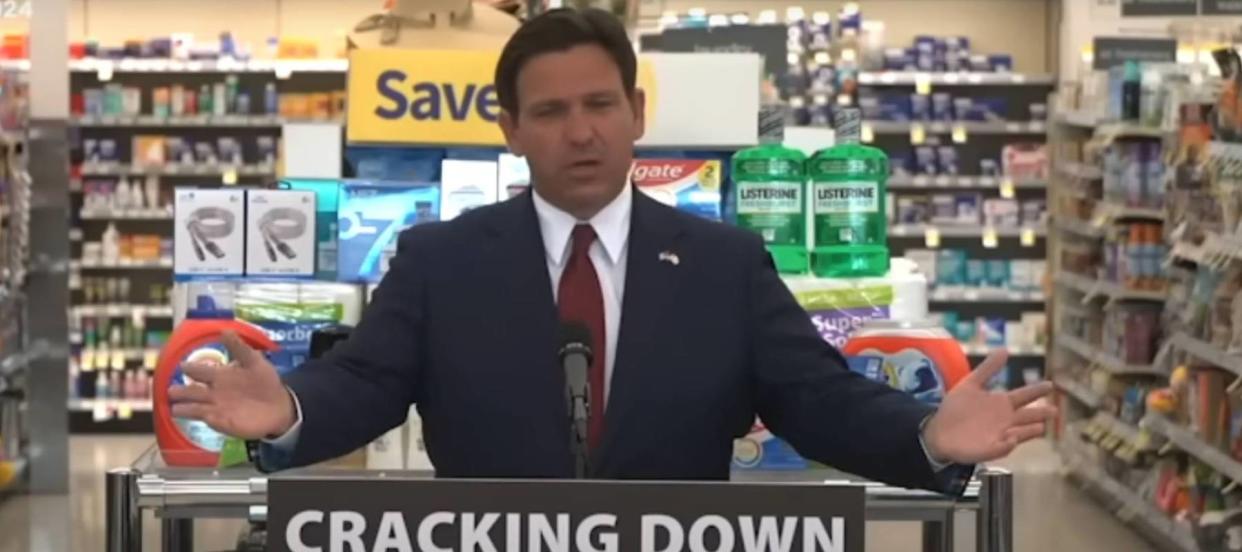‘We will catch you and we will prosecute you’: Florida Gov. Ron DeSantis is cracking down on retail theft – how he’ll ‘distinguish’ the state from ‘lawless jurisdictions’

“If you steal in Florida, we will catch you and we will prosecute you.”
That was the warning issued loud and clear by Florida governor Ron DeSantis after he signed into effect a new law that increases penalties for retail theft and porch piracy in the Sunshine State.
Don't miss
Commercial real estate has beaten the stock market for 25 years — but only the super rich could buy in. Here's how even ordinary investors can become the landlord of Walmart, Whole Foods or Kroger
Cost-of-living in America is still out of control — use these 3 'real assets' to protect your wealth today, no matter what the US Fed does or says
These 5 magic money moves will boost you up America's net worth ladder in 2024 — and you can complete each step within minutes. Here's how
The Republican governor said the new law will “distinguish” Florida from “lawless jurisdictions” like California and New York, where organized retail crime is out of control and thieves are running rampant.
“You see stores closing down in different parts of the U.S.,” DeSantis said in a press conference about the hardline anti-theft bill. “Whether that’s Target closing nine stores in Portland and Seattle, Walmart closing stores in Chicago, Nordstrom closing stores in San Francisco.
“That is a direct result of a lack of commitment to the rule of law and holding criminals accountable. We’re not going to do that in the state of Florida. We’re going to make sure that our retailers are able to sell products, that consumers are able to benefit and that people are held accountable when they break the law.”
Retail theft costs consumers
Organized retail crime has grown so out of control in many parts of the U.S. that stores are resorting to desperate measures — like locking up everyday items, boarding up windows and hiring extra security guards — to stem their losses and protect their staff and consumers.
Retail theft losses ballooned to $112.1 billion in 2022, up 19% from $93.9 billion the year before, according to the 2023 National Retail Security Survey, released in September 2023 by the Loss Prevention Research Council and the National Retail Federation.
Not only is this criminal trend hurting the retail industry, it’s impacting consumers, says DeSantis.
“That has an impact on you as a consumer because the prices will go up to reflect those stolen goods — that’s just basic business,” he said. “If [companies] are not able to sell those goods, if those are losses, they’ve got to find a way to compensate, so you end up seeing rising prices when you go into the store.
“It also just has a demoralizing effect on people when you go in [to a store] and you want to buy toothpaste and it’s like Fort Knox because it’s all under lock and key. For basic items, you’ve got to get a clerk to come and open it … just to do basic shopping. That is not something that is good for quality of life.”
DeSantis also warned that lax rules and penalties around retail theft “creates a contempt for the rule of law” that could “spill over” into other industries and types of organized crime. That lawlessness, he said, is not welcome in the Sunshine State, where he claims shoplifting has decreased by 30% since he took office.
Read more: 'Baby boomers bust': Robert Kiyosaki warns that older Americans will get crushed in the 'biggest bubble in history' — 3 shockproof assets for instant insurance now
Hardline anti-theft bill
Florida’s new anti-theft bill (HB 549) cracks down on retail theft and also what DeSantis described as the “cottage industry of porch piracy,” which is when thieves steal packages left outside doors by couriers.
The law imposes “really serious penalties,” with prison time of between five and 30 years for those who commit retail theft and are involved in organized crime groups of five or more individuals, as well as those who solicit others (via social media) to participate in retail crime.
It also increases the punishments for porch piracy, making repeat offenses and theft of property worth $40 or more both third-degree felonies.
“I think what we’re doing has been successful compared to other jurisdictions,” DeSantis concluded, “but we also know that we’ve got to do what we can to be able to protect public safety.”
What to read next
Jeff Bezos and Oprah Winfrey invest in this asset to keep their wealth safe— you may want to do the same in 2024
'It's not taxed at all': Warren Buffett shares the 'best investment' you can make when battling rising costs — take advantage today
Car insurance premiums in America are through the roof — and only getting worse. But 5 minutes could have you paying as little as $29/month
This article provides information only and should not be construed as advice. It is provided without warranty of any kind.
